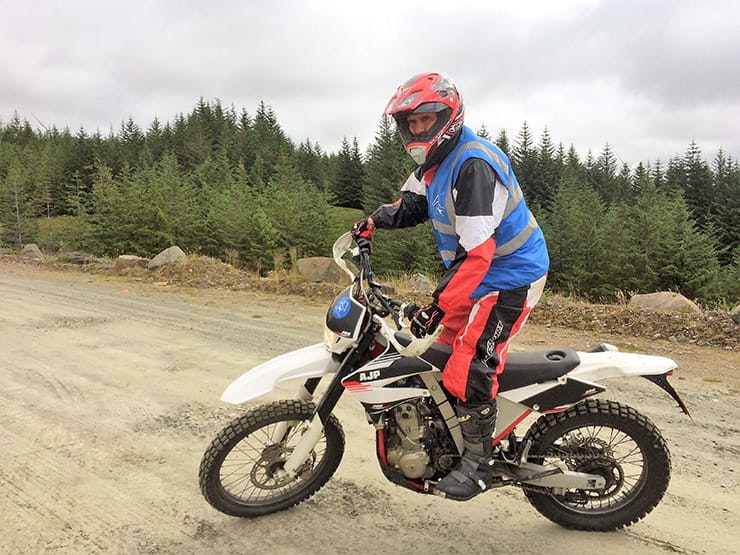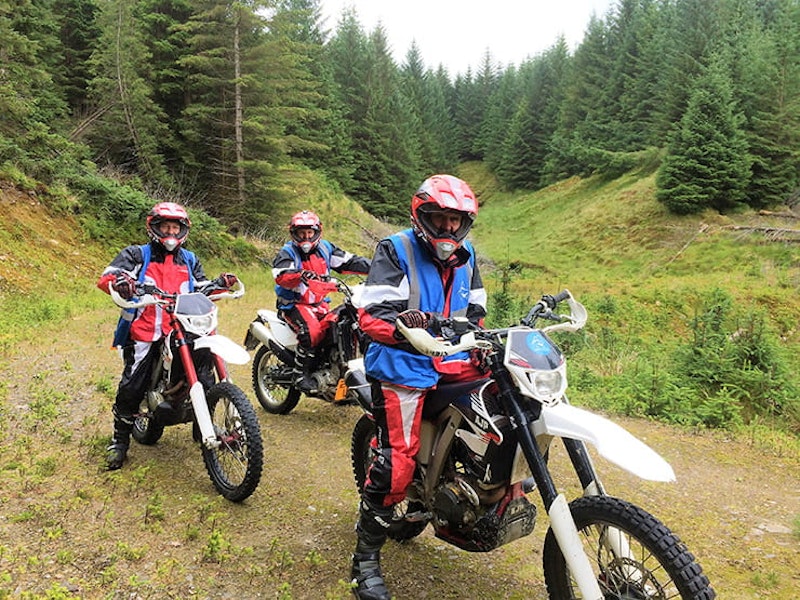Tested: MotoScotland off road school
By Steve Rose
BikeSocial Publisher since January 2017.
22.08.2017
I'm sat at the bottom of a steep, quarter-mile long gravel track. It's been raining since yesterday making the largish rocks and sloppy mud even more tricky. Thirty four hours ago, the 300kg combined weight of me and BMW R1200RS were sat at the other end wondering how the hell we get down there to the HQ of MotoScotland's off road training centre.
This time, I get confidently on the gas, look ahead into the distance and glide up the slope; slipping and sliding, but always going forwards, always under complete control. At the top, I turn around and do it again... and again, just because I now can.
And that, in a nutshell is why this fascinating course is worth every penny. I'm not an off road rider and never really want to be. In 35 years on bikes I've maybe done 35 minutes off road. Not my thing. But part of what Clive Rumbold, the brains behind MotoScotland, wants to achieve is to let road riders learn how to better control a bike in unpredictable and difficult conditions, which makes them safer, more confident and much more capable. For those who do want to learn off road it's a brilliant opportunity to get stuck in, learn the basics from the experts and do it on appropriately manageable bikes, with a seemingly endless variety of surfaces and scenery to build their confidence.
MotoScotland, based in Inveraray has access to 50,000 acres of forest trails. There are three courses; levels one, two and three. Bikes, instruction and high quality, clean kit are provided as are lunch and seemingly endless refreshments. BikeSocial is here to do levels one and two over two days.
It's like riding a bike… sort of
Imagine if you discovered there was a completely different way to do something that you already learned to do instinctively, like riding a bike. What if someone told you that instead of leaning into a turn, you make your body lean the opposite way? It's like being told that walking actually involves putting one leg behind the other or writing a letter needed your arms behind you.
Welcome to off-road motorcycling. Most of the stuff you thought you knew about riding a bike is different here. You can try 'the usual' but it’s rarely the best way.
And that matters because challenging our instincts and demonstrating alternative ways to do the same thing make us think about the physics of that particular situation and learn to react accordingly. Midway through the first morning, Clive comes over. 'Are you enjoying it?'
I want to tell him that it's a lot more complex than that. And that right now I'm too busy trying to process the six new things I've learned today and that 'enjoy' probably isn't the right word...yet, but it will be. Things is, stuck on a Scottish hillside, knackered and sweating probably isn't the right place for a deep conversation, so, instead I just nod and smile.
I'm making that sound negative. Sorry, it isn't. But it is frustrating finding that suddenly you can't do something that you thought you could and part of Clive's syllabus is to challenge your riding to try new things that you never thought possible, like deliberately locking the front wheel again and again, getting ever closer to crashing in order to train your brain to deal with it instinctively. The enjoyment will come later, along with a massive sense of achievement. Right now, I'm too busy concentrating on looking up, scanning further ahead into the distance so I spot the hazards quicker and give myself time to deal with them.
'Look up.' It’s the soundtrack to the two days. I think I am looking up already and on the road I learned a long time ago to look well into the distance and read the road. But here, today, it's proving tricky. Without the skills to cope with the rocks, mud and gravel underneath me, my eyes can't help but look at the hazards. Clive has the patience of a Premiership referee whose mum was a nun. 'Look up.' In the end this turns out to be the thing that makes the biggest difference but it takes some time to get there because the stuff happening ten feet in front of my wheels is far more engaging.
The theory is simple. Stand on the pegs, legs straight, weight leaning slightly forward. Steer the bike with your feet and maybe hands too and if you lean the bike right, move your upright body left to stop the wheels from slipping from under you. That sounds simple, but approaching a muddy, downhill right-hander I instinctively do the opposite - leaning into the turn and pushing the bike away from me to keep it more upright. On the road that works because you are sat down. Here, standing up, my body is too large a lever for that to work, so the bike has to lean into the turn and I lean the other way. Weird, but it works.
Think about speed, use your gears. Engine brake on slippy surfaces, add a little front brake going down a hill. The back brake is more for use recovering a stalled bike on a hill than anything else.
I'm not going to go through the lessons in detail here, but by the end of the first day I've learned how to do a full-lock feet-up U-turn on a sloping gravel surface, control a rear skid from 30mph all the way down to a stop, deliberately lock the front wheel to the point of tucking the front and recover it safely and that an air-cooled, 250cc Chinese trail bike is the equivalent of a Fireblade on these tracks.
Oh, and if all else fails and disaster is imminent, the off road equivalent of the foetal position is to sit down when Clive's not looking and wait for things to straighten up. Even the daftest mistakes somehow right themselves and our dependable little workhorses are seemingly impossible to stall. Not pretty, but I'm surviving.
'Are you enjoying it?' Asks Clive at the end of day one. Yes, I think so. But I'm looking forward to another day to practice and learn more.
Clive tells me that this is the biggest challenge for MotoScotland. 'As a business we want people to have fun and get the skills they want. But to do that properly needs two days, which adds expense for both the cost of the training, but also accommodation and time off work. So we offer Level One in one day to give people the basics, but it's the second day when things really come together.'
He's right. Day two gives us chance to practice the exercises again, but adds more actual trail riding on ever-more-challenging terrain. Bigger rocks, mud, puddles, ruts, wet grass, steeper inclines and descents. All of it testing, but none of it is beyond any of us so long as we...
'LOOK UP'...
And while we're having fun we are subconsciously learning to deal with nightmare scenarios that we might face on the road using simple drills that anyone can do by riding for mile after mile on loose, sloppy and often wet mud and gravel.
At the end of the two days, everyone is tired, but buzzing about what we've done. Our group had a huge range of experience from riders with just a year's experience to a couple about to set off on a two year ride around the planet and another guy I later learned is the deputy chief examiner at Cardington, where they train the motorcycle test examiners, along with his colleague, who helps shape the UK's motorcycle training policy (both of whom are a pleasure to be around, I should add).
Clive is proud that his course receives recognition from the industry as being beneficial to road riders, but more so he's obviously just passionate about everything they do a MotoScotland.
'Are you enjoying yourself?' There's a chalky gravel slime coating the underside of my R1200RS that answers that question better than I can.
Thanks Clive, I had a ball.
We did it too!
Annemarie and Glen from Aberdeen, work on the oil rigs.
Glen. "I've been riding 20 years, mostly on sports bikes. I did a European trail riding weekend a year or so back with some mates where they basically put us on a bike and said 'off you go', it was terrifying. So when Annemarie passed her test last year I thought we might get some proper off road training so we could go ourselves and do it properly.
"The course is brilliant. Best thing for me was the quality of the coaching. They made it easy to learn and encouraged us to nudge our limits. I found it really useful, especially the exercise where we learned to lock and release the front brake without panicking. And also getting the confidence to keep going when your bike is flapping around underneath you."
Annemarie. "The exercises are simple but very effective and the way the course is structured gives plenty of time to practice. I've been riding for a year and so maybe didn't have the ingrained habits of some of the more experienced riders. I'm glad I did the two days too, having the chance to put what we learned in the first day into practice made a massive difference.
"One of the most useful things for me was a really simple one - getting the confidence to only put one foot down when I stopped. I sometimes get worried about not being able to get both feet on the floor, now I realise I don't need to."
Andy from Aberdeenshire, a motorcycle instructor and mechanic came to the course with his partner in preparation for a round the world ride later this year.
"I've ridden motor cross before and done a bit of off-roading so this wasn't new to me. But it was good to get a refresher in before our trip and have someone watch over my riding.
"I got a lot out of it too, having the chance to re-experience things like deep mud, ruts and slippery, rocky roads again. They won't be a surprise now if I come across them again."
Mark, from west London works for the DVSA on training policy for motorcyclists. A qualified examiner, he rides 10-15,000 miles a year, but this was only his second time off road.
"We came here about 18 months ago to do level one and really enjoyed it so are back to do level two. I found it great to learn new techniques and get chance to practice them with an expert on hand to help out.
"This stuff isn't easy but it's both useful and very relevant. My lightbulb moment was realising just how loose a bike can feel beneath you in soft mud and yet still go forwards if you look far enough ahead and keep the power on."
Chris, from Lincoln is a bike examiner for the DVSA. Like Mark, he did level one 18 months ago.
"It's a great environment to learn in and the range of trails available along with the way the complexity increases helps you build confidence. I really enjoyed the opportunity to learn new techniques like deliberately locking the front wheel, but it was also just good fun to ride in deep mud, because you never get chance to that sort of thing normally. "
For more details about the courses available, visit www.motoscotland.com or call 01499 320460

